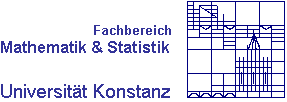|
Theses
|

|
Habilitation theses
- Christian Kirches: Contributions to Direct Optimal Control of Switched and Uncertain Systems, reviewer, University of Heidelberg, 2017
|
Ph.D. theses
- Andreas Schmidt: to be anounced, second reviewer, University of Stuttgart, 2018
- Robert Gerard O'Connor: Reduced Basis Methods for the Analysis, Simulation, and Control of Noncoercive Parabolic Systems, second reviewer, RWTH Aachen University, 2018
- Sebastian Peitz: Exploiting Structure in Multiobjective Optimization and Optimal Control, second reviewer and examiner, University of Paderborn, 2017
- Sebastian Osterroth: Mathematical Models for the Simulation of Combined Depth and Cake Filtration Processesv, second reviewer, University of Kaiserslautern, 2017
- Stefan Trenz: POD-Based A-Posteriori Error Estimation for Control Problems Governed by Nonlinear PDEs, reviewer and examiner, University of Konstanz, 2017
- Mark Daniel Kärcher: Certified Reduced Basis Methods for Parametrized PDE-Constrained Optimization Problems, second reviewer, RWTH Aachen University, 2016
- Martin Gubisch: Model order reduction techniques for the optimal control of parabolic partial differential equations with control and state constraints, reviewer, University of Konstanz, 2016
- Andrea Wesche: Reduced Basis Methods for Model Reduction and Sensitivity Analysis of Complex Partial Differential Equations with Applications to Lithium-Ion Batteries, reviewer and examiner, University of Konstanz, 2016
- Marina Schneider: Model Order Reduction in
Parameter Identification Problems - Error Estimates and Application to Implied Volatility Surfaces, second reviewer and examiner, University of Trier, 2015
- Alexander Sommer: Effiziente und zuverlässige Ordnungsreduktionsverfahren zur breitbandigen Berechnung der Richtcharakteristik von Finite-Elemente-Modellen phasengesteuerter Gruppenantennen, third reviewer, University of Saarbrücken, 2015
- Federico Negri: Efficient Reduction Techniques for the Simulation and Optimization of Parametrized Systems: Analysis and Applications, reviewer and examiner, École Politechnique Fédérale de Lausanne, 2015
- Julia Susanne Springer: Multiphase Adjoint Optimization for Efficient Calculation of Rigid Body Positions in Navier-Stokes Flow, third reviewer and examiner, University of Ulm, 2014
- Oliver Lass: Reduced Order Modeling and Parameter Identification for Coupled Nonlinear PDE Systems, reviewer and examiner, University of Konstanz, 2014
- Matthias Schu: Adaptive Trust-Region POD Methods and Their Applications in Finance,
second reviewer and examiner, University of Trier, 2012
- Martin Sommer: Implementation of an Electrochemical Model for Lithium-Ion Battery Condition Monitoring,
second reviewer and examiner, Graz University of Technology, 2012
- Markus Müller: Uniform Convergence of the POD Method and Applications to Optimal Control,
second reviewer, University of Graz, 2011
- Jan Marburger: Optimal Control Based on Meshfree Approximations, second reviewer, University of Kaiserslautern, 2011
- Michelle Vallejos: Multigrid Optimization Methods for Elliptic Optimal Control
Problems, second reviewer, University of Graz, 2008
- Klaus Prenninger: Objektive Fahrdynamikanalyse von Kraftfahrzeugen mittels
modellbasierter Paramateridentifikation, second reviewer and examiner, Graz University of Technology, 2008
- Patricia Astrid: Model Reduction Techniques for Process
Simulations: a Proper Orthogonal Decomposition Approach,
second reviewer and examiner, Eindhoven University of Technology, 2004
- Juan Carlos de los Reyes: Constrained Optimal Control of Stationary Viscous Incompressible Fluids by a
Primal-Dual Active Set Method, second reviewer and examiner, University of Graz, 2003
|
Master theses
- Freya Bachmann: A Branch-and-Bound Approach to Mixed-Integer Optimal Control Using POD, University of Konstanz, 2017
- Marco Daub: Konvexe Optimierung am Beispiel volumenmaximaler einbeschriebener Rechtecksmengen, University of Konstanz, 2017
- Stefan Banholzer: POD-Based Bicriterial Optimal Control of Convection-Diffusion Equations, University of Konstanz, 2017
- Kathrin Melcher: Optimization with ODE Constraints for the Ultrafiltration Rate during Hemodialysis Treatment, University of Konstanz, 2016
- Felicitas Binder: Sensitivity analysis for a parametrized model for erythropoiesis involving structured population equations with one structural variable, University of Konstanz, 2016
- Elena Schnell: Using POD Methods for Option Pricing with Jump Diffusion Models, University of Konstanz, 2015
- Kevin Sieg: Application of Proper Orthogonal Decomposition to Population Balance Equations of Particulate Processes, University of Konstanz, 2014
- Jianjie Lu: Affine POD Galerkin schemes for option pricing in jump-diffusion models, University of Konstanz, 2014
- Marco Menner: Einsatz von mathematischer Optimierung bei der Auslegung von Strom-, Gas- und Fernwärmenetzen, University of Konstanz, in cooperation with the company Rechenzentrum für Versorgungsnetze Wehr GmbH, 2013
- Eva Grimm: Optimality System POD and A-Posteriori Error Analysis for Linear-Quadratic Optimal Control Problems, University of Konstanz, 2013
- Tamara Kümpflein: Development of a FEM Solver for a
Nonlinear 3D Semiconductor Model, second reviewer, University of Konstanz, 2013
- Patrick Knapp: POD Based Model Reduction for High Pressure Hydrogen Gas Storage Fueling
Process, University of Konstanz, 2013
- Eva Hägele: Suboptimale modellprädikative Steuerung des
Herzkreislauf- und Atmungssystems, University of Konstanz, 2012
- Antonio Stoyanov: Predicting Patterns in Financial Time Series Using a Genetic Algorithm,
second reviewer, University of Konstanz, 2011
|
Diploma theses
- Tibor Herrmann: Ein Shape-From-Shading-Ansatz mit Quadrikenmodell zur Objekterkennung, University of Konstanz, 2018
- Jan Wilhelm Ruh: Lagrange Ansätze für das Pooling Problem, University of Konstanz, 2017
- Clemens Handler: Positivity preserving iterative algorithms for deconvolution problems, second reviewer,
University of Konstanz, 2016
- Nicolas Kreuzer: Asymptotische Stabilität von POD-basierter modellprädiktiver Regelung für partielle Differentialgleichungen, University of Konstanz, 2016
- Simone Metzdorf: Optimality system POD for time-variant, linear-quadratic control problems, University of Konstanz, 2015
- Laura Lippmann: Optimal administration strategies for EPO based on the model for erythropoiesis involving structured population equations with one structural variable, University of Konstanz, 2015
- Dennis Beermann: Reduced-Order Methods for a Parametrized Model for Erythropoiesis Involving Structured Population Equations with One Structural Variable, University of Konstanz, 2015
- Carmen Gräßle: POD based Inexact SQP Methods for Optimal Control Problems governed by a Semilinear Heat Equation, University of Konstanz, 2014
- Robert Schwieger: Entwicklung und Untersuchung von Interpolationsverfahren zur Schnittstellenoptimierung zwischen semiautomatischer 2D- und 3D-Segmentierung zur Abgrenzung dreidimensionaler Gehirnstrukturen, University of Konstanz, 2014
- Sabrina Rogg: Trust Region POD for Optimal Boundary Control of a Semilinear Heat Equation, University of Konstanz, 2014
- Xi Zhang: Optimale Steuerung des Herzkreislauf- und Atmungssystems mit Zustandsbeschränkungen, University of Konstanz, 2013
- Lena Meyer: Development of a Flexible 3D-FEM
Software Package for Second Order Equations, second reviewer, University of Konstanz, 2013
- Milda Jasunaite: Numerische Analyse einer nichtlinearen degenerierten elliptischen Gleichung für die mathematische
Bildverarbeitung, University of Konstanz, 2012
- Charlotte Schroer: Modellprädiktive Regelung unter Verwendung von POD Modellreduktion,
University of Konstanz, 2012
- Alina Studinger: Numerical Analysis of POD a-posteriori error estimates for
linear-quadratic optimal control problems, University of Konstanz, 2011
- Christine Haffelt: Runge-Kutta-artige Verfahren für nichtlineare Integralgleichungen, second reviewer, Universität Konstanz, 2011
- Stefan Wolf: Optimization of Pacing Strategies for Cycling Time Trials, second reviewer,
University of Konstanz, 2011
- Oliver Lass: Space Mapping Technique for the Optimization of a Thickness Parameter in
the p-Laplace Equation, University of Graz, 2009
- Bernhard Brunnsteiner: Effiziente Modellreduktion von nichtlinearen, parameterabhängigen PDEs, University of Graz, 2009
- Benjamin Gotthardt: Parameterschätzung eines nichtlinearen Einspur-Fahrzeugmodells, in cooperation with the Institute of Automotive Engineering (Prof. Dr. W.
Hirschberg, TU Graz), 2009
- Christian Mayer: Verification and improvement of the oil balance calculation in hydrodynamic
lubricated radial slider bearings, in cooperation with AVL List GmbH, University of Graz, 2008
- Martin Kahlbacher: Galerkin proper orthogonal decomposition methods for scalar parameter estimation in elliptic systems, Universität Graz, 2006
- Andreas Omann: Modellbasierte Ansätze/Neuronale Netze zur Beschreibung des fahrbaren Bereichs bei Verbrennungsmotoren, in cooperation with AVL List GmbH, TU Graz, 2006
- Alexander Schwaigkofler: Adaptive Ventiltechnologie für hydraulische Systeme, in cooperation with Julius Blum GmbH, TU Graz, 2006
- Ian Kopacka: Analysis and Optimization of Valve Train Dynamics in Frequency Domain, in cooperation with AVL List GmbH, Universität Graz, 2005
- Melanie Wogrin: Trust-Region Newton-CG Verfahren zur Optimalsteuerung der Laser-Intensität bei der Laser-Oberflächenhärtung von Stahl, University of Graz, 2004
- Franz Diwoky: Proper Orthogonal Decomposition-Methods for the
Opimal Control of a Nonlinear Heat Equation, second reviewer, University of Graz, 2000
Theses (Zulassungsarbeit)
- Konstantin Ott: SQP-Verfahren zur hydraulischen Auslegung von Wassernetzen, University of Konstanz, 2015
- Markus Brack: Optimale Snapshotwahl bei gekoppelten elliptisch-parabolischen Systemen aus der Batteriemodellierung, University of Konstanz, 2013
Bachelor theses
- Christian Jäkle: Simplex und das Branch-and-Bound-Verfahren mit Implementierung in Python, University of Konstanz, 2017
- Simon Buchwald: Implementierung des L-BFGS-B-Verfahrens in Python, University of Konstanz, 2017
- Marco Bernreuther: Solving Mixed-Integer Programming Problems Using Piecewise Linearization Methods, University of Konstanz, 2017
- Fritz Hartmann: FD-Verfahren zum Lösen einer linearen Wärmeleitungsgleichung: Herleitung und Implementierung in Python, University of Konstanz, 2016
- Jonas Siegfried Jehle: Das Gauß-Newton-Verfahren zur Lösung nichtlinearer Parameterschätzprobleme, University of Konstanz, 2016
- Jessica Odenwald: Convex optimization and its application in optimal transport, second reviewer, University of Konstanz, 2016
- Rebekka Müller: Eine Einführung in den Simplex-Algorithmus, University of Konstanz, 2015
- Kathrin Maria Kölle: Parameterschätzungen bei Anfangswertproblemen, University of Konstanz, 2015
- Robert Leitner: Nonlinear conjugate gradient methods for discretized elliptic optimal control problems, University of Konstanz, 2015
- Sebastian Sahli: FD-Verfahren für die Gleichungen der linearen Elastizitätstheorie, second reviewer, University of Konstanz, 2013
- Freya Bachmann: Proper Orthogonal Decomposition für lineare parabolische Differentialgleichungen, University of Konstanz, 2012
- Marco Daub: Linear-quadratische Regelung von parabolischen Differentialgleichungen,
University of Konstanz, 2012
- Daniel Schropp: Modellreduktion mit Balanced Truncation,
University of Konstanz, 2012
- Nicole Zutavern: Linear-quadratische Steuerung diskretisierter elliptischer Differentialgleichungen,
University of Konstanz, 2012
- Min Xue: Differential-Algebraische Gleichungen vom Index 1 und 2 mit Anwendungen auf elektrische Schaltkreise, second reviewer,
University of Konstanz, 2012
- Tina Stark: Das Verfahren der konjugierten Gradienten für elliptische Differentialgleichungen: Herleitung und Analyse,
University of Konstanz, 2012
- Patrick Knapp: Newton-Verfahren zur optimalen Steuerung nichtlinearer elliptischer Randwertaufgaben, University of Konstanz, 2011 (Bachelor seminar and examples: Example 1.5, Example 2, Example 3)
- Kevin Sieg: Sequentielle quadratische Programmierung zur optimalen Steuerung einer nichtlinearen elliptischen Randwertaufgabe, University of Konstanz, 2010
- Tamara Kümpflein: Parameteridentifikation in einem Solarzellenmodell, second reviewer, University of Konstanz, 2009
|
|
| | | |



